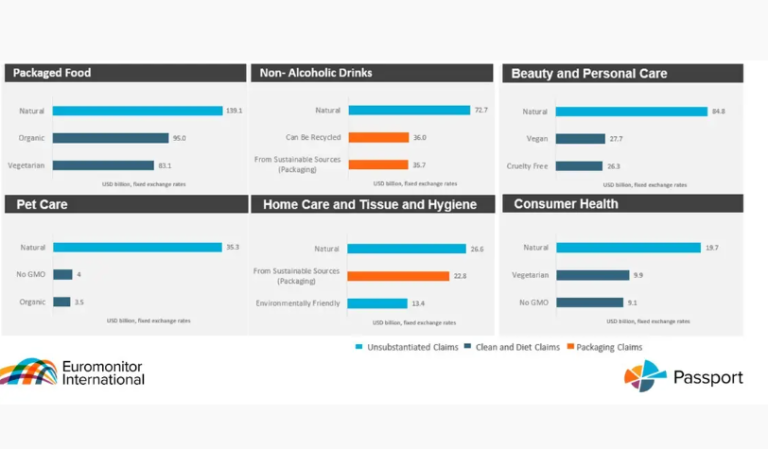Over 60% of businesses worldwide implemented a sustainability strategy in 2024, but only 10% feel they are effectively communicating their efforts, according to new data from Euromonitor International. The findings are part of the firm’s updated Passport Sustainability platform, which offers businesses the ability to track sustainability claims, understand consumer sentiment, and develop more effective strategies.
The platform’s 2023 data revealed that one-fifth of all global sales were for products featuring sustainability claims, with such products experiencing an average sales growth rate of 1.5% higher than non-sustainable alternatives over the past four years. This underscores the rising consumer demand for sustainable goods, as businesses seek to align their offerings with shifting environmental and ethical priorities.
Passport Sustainability now spans 11 industries, 25 global markets, 50 product categories, and monitors more than 70 sustainability claims. It provides vital insights for companies navigating the complex landscape of consumer expectations and regulatory requirements in sustainability.
Clear Communication Key to Guard Against Greenwashing
Maria Bogdanova, Senior Product Manager for Sustainability at Euromonitor International, emphasised the need for clear communication in the promotion of sustainable products. She warned that ambiguous terms could lead to accusations of greenwashing, where companies are seen to be overstating their environmental credentials.
“‘Natural’ remains the leading sustainability claim by value sales,” said Bogdanova. “However, its vagueness has raised concerns, particularly in the beauty, personal care, and pet care industries. In 2023, 39% of beauty and personal care products, and 37% of pet care products, carried ‘natural’ claims. Regulatory bodies in the EU and several US states are addressing this by banning unsubstantiated claims.”
Top Value Sales Claims: Organic, No GMO, Vegan
Beyond the broad ‘natural’ claim, other leading sustainability claims include Organic, No GMO, and diet-related claims such as Vegan and Vegetarian. These clean labels rank among the top three in value sales across sectors like packaged food, beauty, personal care, pet care, and consumer health.
“Breakfast cereal is leading the charge, with over 20% of its products featuring a vegetarian claim,” Bogdanova noted. “Other sectors, like sweet biscuits, snack bars, and fruit snacks, have lower levels of such claims at around 9%. However, investment from retailers like Tesco, Walmart, Carrefour, and Lidl is expected to drive growth in this area.”
Zero Waste and B Corp Certification On the Rise
Among the fastest-growing sustainability claims, Zero Waste and B Corp certification are emerging as key trends. Zero Waste initiatives aim to reduce raw material use and minimise waste, while B Corp certification signifies a company’s commitment to high social and environmental standards.
The beauty industry has the largest number of B Corp-certified products, with brands such as The Body Shop, Dr Hauschka, and Elemis embracing the rigorous certification process. Additionally, B Corp-certified products in the staple foods and snacks sectors have grown by 49% and 40%, respectively, over the past two years.
To explore the insights offered by Euromonitor’s Passport Sustainability platform, interested businesses are encouraged to book a demonstration.


